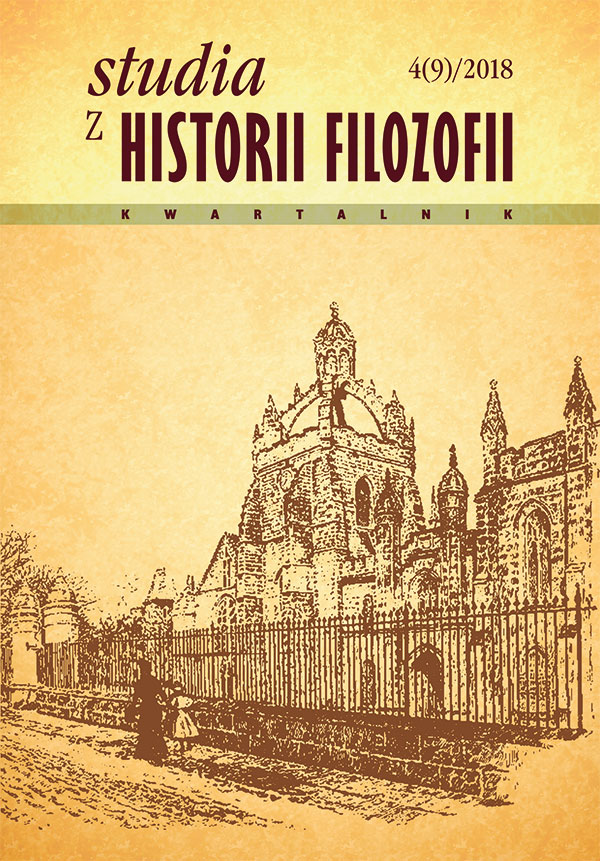Dual Sense of Kantian Way of Conceiving of Aesthetical Values
DOI:
https://doi.org/10.12775/szhf.2018.056Keywords
Kant, aesthetics, aesthetic judgments, aesthetic values, sensual cognition, logical cognitionAbstract
This article draws attention to the difference between empirical and logical cognition that occurs in Kant's philosophy. First of all, we want to show how the concept of aesthetics evolved in Kant’s philosophy. Although it might seem that the Königsberg philosopher’s concept of aesthetics from the Critique of Pure Reason is diametrically different from that which occurs in the Critique of the Power of Judgement, we want to argue here that in reality these two ways of thinking about aesthetics are related. For this purpose, it is important to indicate the fact that sense experience is also a kind of cognition, different from the scientific, objective or mathematical one; nevertheless, it is a cognitive element of the world and, what is more, it exists earlier that the scientific cognition. In this context it is easier to understand Kant's considerations about the universality of some aesthetic judgments. This part of the article closes with an attempt to show why the German philosopher does not want to give colors the same status as the form in a work of art. In order to make the audience aware of the importance of these two types of cognition in Kant's aesthetics, we also look at some examples from the analysis of the sublime.
The aim of the article is not to discover any unknown, new connections between concepts that are present in Kant’s philosophy, but rather to show the Polish reader how clearly the connections between these concepts are present in all Critiques, and that when considering one category, one should always remember about a holistic view.References
Costazza Alessandro. 1997. Das „Charakteristische“ ist das „Idealische“. Über die Quellen einer umstrittenen Kategorie der italienischen und deutschen Ästhetik zwischen Aufklärung, Klassik und Romantik. W Beiträge zu Komparatistik und Sozialgeschichte der Literatur. Festschrift für Alberto Martino, Hrsg. von Norbert Bachleitner, Alfred Noe, Hans-Gert Roloff, 463 – 490. Amsterdam: Rodopi.
Hegel Georg Wilhelm Friedrich. 1964. Wykłady o estetyce, tłum. Adam Landman, Janusz Grabowski. Warszawa: Państwowe Wydawnictwo Naukowe.
Hirt Aloys. 1797. „Versuch über das Kunstschöne“. Die Horen 11 (7) : 1–37.
Leibniz Gottfried Wilhelm. 1969. Zasady natury i łaski oparte na rozumie. W Wyznanie wiary filozofa, tłum. Stanisław Cichowicz, 99–111. Warszawa: Państwowe Wydawnictwo Naukowe.
Kant Immanuel. 2018. Korespondencja. Tłum. Mirosław Żelazny. Toruń: Wydawnictwo Naukowe Uniwersytetu Mikołaja Kopernika.
Kant Immanuel. 2013. Krytyka czystego rozumu. Tłum. Mirosław Żelazny. W: Immanuel Kant, Dzieła zebrane, t. 2. Toruń: Wydawnictwo Naukowe Uniwersytetu Mikołaja Kopernika.
Kant Immanuel. 2014. Krytyka władzy sądzenia. Tłum. Mirosław Żelazny. W: Immanuel Kant, Dzieła zebrane, t. 4. Toruń: Wydawnictwo Naukowe Uniwersytetu Mikołaja Kopernika.
Mendelssohn Moses. 1974. Über das Erhabene und Naive, W: Moses Mendelssohn, Ästhetische Schriften in Auswahl. Darmstadt: Wissenschaftliche Buchgesellschaft.
Wallis Mieczysław. 2004. Wartości estetyczne łagodne i ostre. W: Mieczysław Wallis, Wybór pism estetycznych. Kraków: Universitas.
Żelazny Mirosław. 1994. Źródłowy sens pojęcia estetyka. Toruń: Wydawnictwo Uniwersytetu Mikołaja Kopernika.
Downloads
Published
How to Cite
Issue
Section
Stats
Number of views and downloads: 4283
Number of citations: 0



